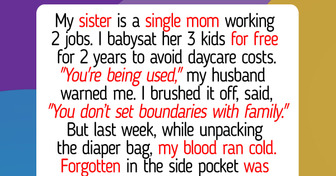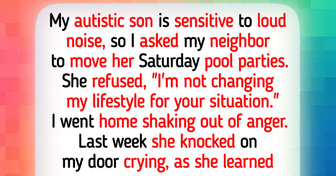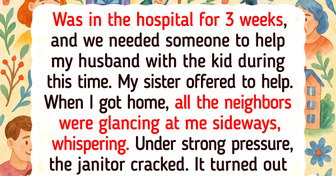My family members were in a religion. We all split up and went our ways in different ways. I realised that life struggles can't be easily turned upside down and answering other people's riddles as to give good advice is compromised by that belief system we now disagree with. Parents do not know everything. Children grow up and start forming their own advice and you can't go against that. But you can be a good friend. And if the family young adult doesn't want to talk to you then don't push it. Look at the things they are doing right and validate that make it righter and DON'T make it wronger. No looking for the troubles and trying to fix it. But give real life examples how to grow and be successful and look into the light so to speak. Light hearted for girls and well done son for boys. Acknowledgement for achievement. This is good psychology. Psychology that gets positive results not drugs for ADHD. Please listen to your children and help build their dreams.
My Ex’s Wife Made My Teen Babysit Their Baby All Night—So I Took Drastic Action

Raising children presents plenty of obstacles, particularly when stepfamilies are involved and roles aren’t clearly defined. It’s quite natural for parents to be concerned about their children’s welfare, especially when they sense that their child is being treated unjustly. Rules, discipline methods, and expectations often differ from one home to another, which can result in tough choices and emotional tension. Recently, a worried mother contacted us to describe a difficult situation with her teenage daughter and her former husband’s new household, hoping to receive some helpful advice.
Caroline’s letter:
" Hi Bright Side,
My ex and his wife just had a baby. Last night, my teenage daughter—sobbing—called me. She’s stuck babysitting the baby overnight as her stepmom told her, “This house isn’t a free hotel. You need to pay me somehow!” I was furious.
Next morning, I had a plan: I arranged a surprise visit from Child Protective Services. They interviewed my ex-husband, his current wife, and my daughter. In the end, CPS determined there wasn’t enough proof to proceed further. My ex saw this as a harsh move—and to my surprise, so did my daughter.
I can’t shake the guilt that I may have stirred up unnecessary chaos in her life. Still, as her mother, I’m heartbroken and worried. It’s not right for a teenager to lose sleep because she’s being made to care for an infant that isn’t her responsibility—especially when she has school the next day. Now I’m torn, unsure of how to advocate for her without escalating the situation further.
Bright Side, I’m really in need of your insight. What should I do?
Sincerely,
Caroline "
Thank you, Caroline, for sharing your concerns with us. We’re here to support you as much as possible and have put together 4 pieces of advice to help you navigate this situation thoughtfully. Our goal is to assist you in addressing the issue with your ex-husband and his new family while ensuring your daughter’s well-being—without escalating conflict.
Consider other living options if necessary.
If the current circumstances are harshly affecting your daughter’s well-being, then you may consider discussing with her whether she’d feel safer living with you, even part-time. If needed, revisit custody agreements. It’s important to speak with a legal professional to understand your options and the steps involved. If relocating isn’t feasible, look into other supportive measures such as therapy to help her manage the stress she’s facing. Although altering her living arrangements is a significant decision, her emotional and psychological health must remain the top priority.
Restoring the bond with your daughter comes first.
Your daughter’s response to the CPS visit may indicate that she’s feeling torn between both homes, which makes it all the more important to rebuild your emotional connection with her. Instead of dwelling on the incident itself, create a space where she can talk openly and honestly, knowing she won’t be judged for how she feels.
Reassure her that everything you’ve done has been motivated by love and a desire to protect her, but also be willing to recognize how your choices might have unintentionally added to her stress. Rather than deciding what’s best for her on your own, ask her directly what she needs and how she wants to be supported. Showing that you’re truly listening can help restore her trust, and once she sees you as an ally who isn’t adding pressure, she may become more willing to work with you on finding a way forward.
Discuss boundaries with your ex.
It’s evident that your daughter is being placed in an inappropriate and unbalanced role by your ex-husband and his spouse. However, confronting the situation with frustration or anger may only cause them to become more defensive. Instead, aim for a constructive dialogue centered on finding mutual understanding—possibly with the help of a neutral third party or mediator.
Approach the discussion by acknowledging that while your daughter can contribute with minor responsibilities, she is still a teenager with academic demands and should not be expected to take on the duties of a caregiver. Introduce clear, practical boundaries—like no late-night responsibilities on school nights—to show you’re seeking a reasonable solution rather than just placing blame.
If they push back, gently reinforce that their home should be a nurturing space, not one where your daughter feels she has to “earn” her place by sacrificing her own needs or well-being.
Encourage your daughter to voice her feelings.
As a teen, your daughter has the maturity to articulate her needs, though she might still feel uncertain or powerless in challenging situations. Support her in finding her voice by encouraging her to speak up in ways that protect her well-being while clearly communicating her boundaries. One helpful approach is to practice potential dialogues with her, allowing her to rehearse calm but assertive statements—such as, “I’m willing to help out, but I also need enough rest for school, so I can’t manage late-night responsibilities.”
It’s important for her to understand that setting boundaries isn’t an act of defiance—it’s a form of self-respect. When she feels empowered to advocate for herself, it can change the atmosphere at home and reduce the pressure on you to intervene on her behalf.
Office life is anything but straightforward—especially when drive, competition, and private struggles come head-to-head. In this link, you’ll discover the shocking tale of a woman who caught her colleague in the act on video... only to learn that some revelations are best left in the dark.
Comments
Your daughter may be bearing the brunt of your ex's and his wife's anger about the visit from CPS. They may be telling her "This is all YOUR fault! If YOU hadn't snitched to your mom then we wouldn't have been embarassed by that CPS visit! This isn't a free hotel - you earn your keep or you're dead to both of us!" etc., etc. etc. Now hopefully they AREN'T doing that, but given their general attitudes towards her, I'm afraid that she'd be right to fear that this intervention would be blamed on her and that she would suffer for it.
Related Reads
I Refused to Let My DIL’s Entitled Kid Take Over My Airplane Seat

10 Real Stories With Twists So Dark, They Put Hollywood Movies to Shame

10 Times Kids Spilled Family Secrets and Shocked the Entire Room

I Refused to Babysit My Sister’s Kids for Free, Now My Whole Family Is Against Me

16 Tiny Acts From Strangers That Left Permanent Marks on People

I Refused to Let My 32-Year-Old Daughter Live With Me Rent Free—Until She Told Me the Real Reason

I Refused to Follow My Boss’s Dress Code—HR Had to Step In

16 Men Who Proved True Love Isn’t About Big Words, but About Quiet Actions That Melt the Heart

13 Double-Life Stories That Prove Even Those Closest to Us Have Secrets

My Neighbor Refused to Help My Autistic Son, She Wasn’t Ready for My Revenge

10 True Stories With Endings So Wild, Hollywood Couldn’t Write Them Better

18 Stories That Prove Living in an Apartment Is Like Having a Front-Row Seat to a Comedy Show




